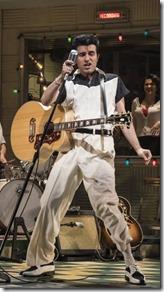
Irresistible and unstoppable
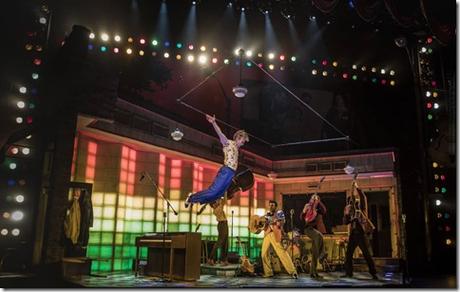
Review by Catey Sullivan
Million Dollar Quartet is irresistible. Set during the only recording session when Elvis Presley, Johnny Cash, Jerry Lee Lewis and Carl Perkins were all in the same room, the juke-box musical captures lightning in a bottle. The Dec. 4, 1956 gathering at Memphis' was never to be repeated. Inspired by this meeting of four musical icons, Floyd Mutrux cobbled together a juke box show that rocks, rolls, rages and smolders through nearly two dozen hits, from the haunting a cappella harmonies of "Peace in the Valley" to the inspired mania of "Great Balls of Fire."
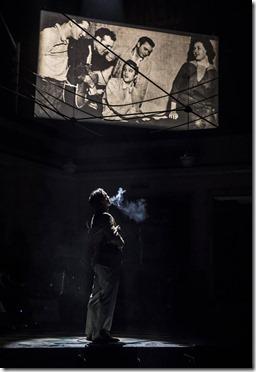
And yet, for all its inarguable merits, Million Dollar Quartet comes with an asterisk. Scour the cannon: There's probably no contemporary musical in existence that does more cultural appropriating than .
A significant portion of the tunage bringing down the house here was originally written and/or recorded by artists of color. Little Richard, Big Mama Thornton, Smiley Lewis, Eddie Cooley and Little Willie John are the originators of songs including "Hound Dog," "Fever," "I Hear You Knockin'" and "Long Tall Sally." Furthermore, "Peace in the Valley" and "Down by the Riverside" are Negro spirituals that date back to the plantation era deep South.
The cast of is unilaterally Caucasian. The music is not. And while this is a show about four white rock superstars, it seems wrong not to somehow reference the artists of color without whom Elvis, Johnny, Carl and Jerry Lee might not have become superstars.
has only two brief mentions of the music's roots. One comes when Carl Perkins recalls "Uncle John," a field-hand who taught him to play guitar. The second comes from Sam Phillips, who famously said he could make a million dollars if only he could find "a white boy who could sing like a black man." Enter Elvis. And countless millions.
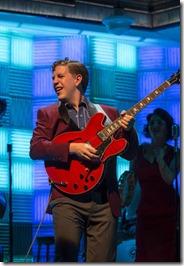
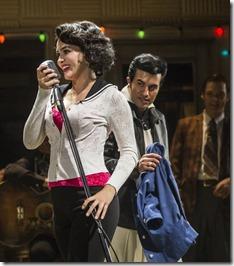
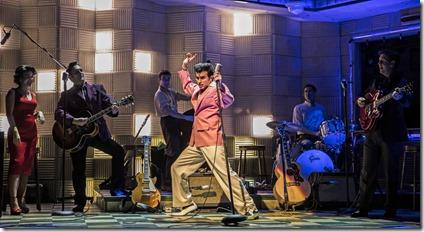
There's a reason the music of Million Dollar Quartet can basically print money. It makes you feel alive. It's a sonic reflection of primal carnal instincts and profound, aching melancholy and every emotion in between. It speaks to the darkest impulses of the human soul ("I shot a man in Reno, just to see him die.") and the heights of giddy ecstasy ("Goodness gracious, great balls of fire!"). It commiserates with life's trials and celebrates its triumphs. To paraphrase the fire-breathing gospel of Jerry Lee Lewis, rock and roll isn't a fad. It's a religion and a revolution that will blaze on forever.
Corti, music director Kory Danielson and their ensemble understand the power of the music they've been entrusted with and they tap into it with the intensity and fervor of the born-again speaking in tongues at a backwoods tent revival.
The cast is extraordinary, both vocally and on the instruments each plays. The showboat in the group is Gavin Rohrer's Jerry Lee Lewis, who attacks the piano with his hands, feet and upside down without missing so much as a thirty-second note. Rohrer's piano skills are virtuosic, his energy level is beyond the stratosphere, and his show-stopping renditions of "Great Balls of Fire" and "Wild One" are worthy of the Killer himself.
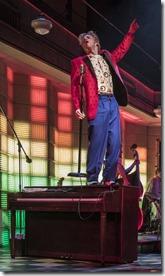
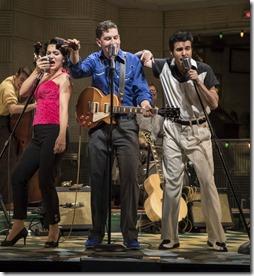
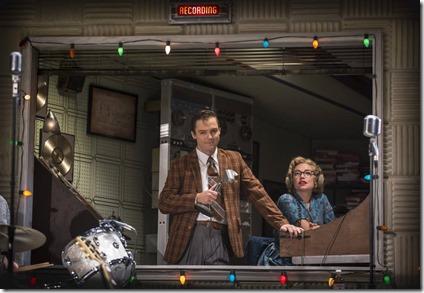
As Johnny Cash, Bill Scott Sheetshas a velvet, operatic basso that dips down to what surely sounds like a bygod C2 (the C two octaves below Middle C). "Folsom Prison Blues" and "I Walk the Line" will send chills down your spine. Sheets also does some mesmerizing vocal sparing with Adam Wesley Brown's Carl Perkins in a harmonizing duel between "16 Tons" and "My Babe." Their voices are like twined snakes, immensely powerful and inarguably seductive.
Kavan Hashemian's Elvis has the King's signature pelvic gyrations on lockdown. He captures the rhythmic salaciousness of "Hound Dog" and "That's All Right Mama" with a joyful, sneering verve. As Elvis's girlfriend Dyanne, Courtney Mack blisters through "Fever," and gives a sizzling, empowered growl to "I Hear You Knockin."
When the group simmers down for "Peace in the Valley," they take the harmonies to church with hushed reverence that's next to sublime.
The quartet is backed up by bassist Zach Lentino and drummer Scott Simon, who together give the music a thrumming undercurrent that sets the pace with ferocity and grace.
Kevin Depinet's set design beautifully fills the stage's massive space, backing the intricately detailed interior of Sun Studio with a twilight swath of Memphis. barely needs a set - during its successful 8-year run at Chicago's Apollo Theatre, Sun Studio was decidedly a minimalist joint on a postage stamp stage. Blowing the scenic design up to fill the cavernous Paramount without losing the show's intimacy is not an easy task, but Depinet gets it done.
Corti and Danielson have put together a production that sounds terrific and feels like a party. Still, it might well leave you wishing the show's authors would revisit the piece and somehow incorporate more about the genesis of all that amazing music.
Million Dollar Quartet continues through October 29th at Paramount Theatre, 23 E. Galena Blvd., Aurora (map), with performances Wednesdays 1:30pm & 7pm, Thursdays 7pm, Fridays 3pm & 8pm, Saturdays 3pm & 8pm, Sundays 1pm & 5:30pm. Tickets are $36-$64, and are available by phone (630-896-6666) or online through their website (check for availability of ). More information at ParamountAurora.com. (Running time: 1 hour 55 minutes, includes an intermission)
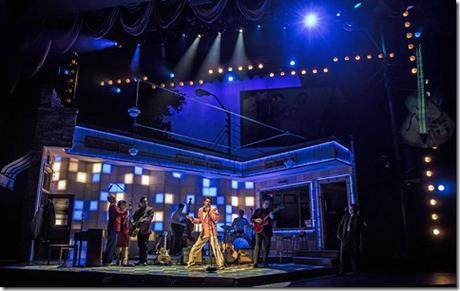
Photos by Liz Lauren
Nicholas Harazin (Sam Phillips), Adam Wesley Brown (Carl Perkins), Bill Scott Sheets (Johnny Cash), Gavin Rohrer (Jerry Lee Lewis), Kavan Hashemian (Elvis Presley), Zach Lentino (Brother Jay), Scott Simon (Fluke), Courtney Mack (Dyanne), Jessie Pinnick (Marion Kiesker, understudy Dyanne).
Understudies: Kent Lewis (Johnny Cash, Sam Phillips), Zachary Stevenson (Johnny Cash), Michael Kurowski (Jerry Lee Lewis, Marion Kiesker), Doug Pawlik (Elvis Presley), Andrew Frace (Sam Phillips, Johnny Cash, Oct. 18 - 29), Jake Saleh (Brother Jay), Ethan Deppe (Fluke).
behind the scenes
(director), Kory Danielson (music director), Kevin Depinet (set design), Sally. Dolembo (costume design), (lighting design), Adam Rosenthal (sound design), Katie Cordts (wig, hair and make-up design), Amanda Relaford (props desogm), Susan Gosdick (dialect coach), Maggie O'Donnell (stage manager), Trent Stork (associate director), Ethan Deppe (associate music director), Liz Lauren (photos)
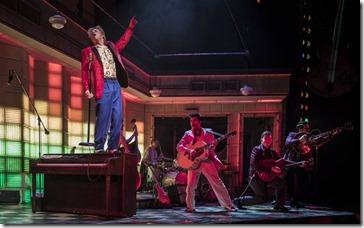
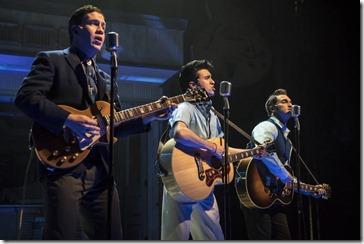
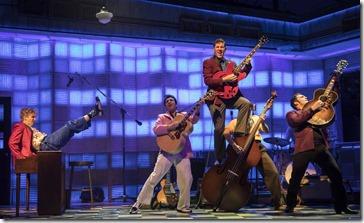
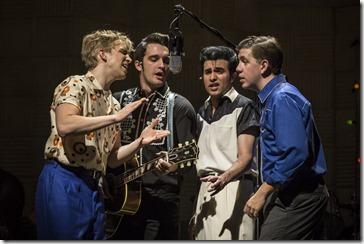
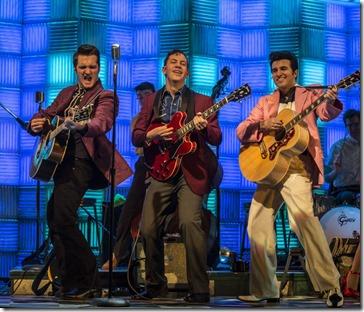
Tags: 17-0939, Adam Rosenthal, Adam Wesley Brown, Amanda Relaford, Andrew Frace, Bill Scott Sheets, Carl Perkins, Catey Sullivan, Chicago musical theater, Chicago Theater, Colin Escott, Courtney Mack, Doug Pawlik, Elvis Presley, Ethan Deppe, Floyd Mutrux, Gavin Rohrer, Jake Saleh, Jerry Lee Lewis, Jesse Klug, Jessie Pinnick, Jim Corti, Johnny Cash, Katie Cordts, Kavan Hashemian, Kent Lewis, Kevin Depinet, Kory Danielson, Liz Lauren, Maggie O'Donnell, Michael Kurowski, Nicholas Harazin, Paramount Theatre, post, Sally Dolembo, Sam Phillips, Scott Simon, Susan Gosdick, Trent Stork, Zach Lentino, Zachary Stevenson

